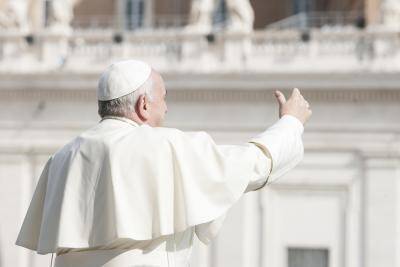Christian hope is a humble and strong virtue that supports us, so that we do not drown under the many difficulties we face in life. That was Pope Francis’ message at the morning Mass at the Casa Santa Marta. The Pope said that hope in the Lord never disappoints us; it’s a font of joy and peace in our hearts.
Jesus speaks with the doctors of the law, and affirmed that Abraham “rejoiced in hope” to see His day. Pope Francis preached his homily on this passage from the day’s Gospel, to show how hope is fundamental in the life of the Christian. Abraham, he said, “had his temptations along the path of hope,” but he believed and obeyed the Lord, and so set out on the journey to the promised land.
There is, then, the Pope said, something like a “thread of hope” that joins “the whole story of salvation” and is a “font of joy.”
Today the Church speaks to us of the joy of hope. In the first prayer of the Mass we asked for the grace of God to keep us in the hope of the Church, because it does not ‘fail.’ And Paul, speaking of our father Abraham, tells us: ‘He believed against all hope.’ When there is no human hope, there is that hope that carries us forward, humble, simple—but it gives a joy, at times a great joy, at times only of peace, but the security that hope does not disappoint: hope doesn’t disappoint.
This “joy of Abraham,” this hope, he continued, “grows throughout history.” “At times,” he admitted, “it is hidden, it is not seen; at times, it is clearly manifested.” Pope Francis cited the example of the pregnant Elizabeth, who rejoiced at the visit of her cousin Mary. It is “the joy of the presence of God,” he said, “that journeys with His people. And where there is joy, there is peace. This is the virtue of hope: from joy to peace. This hope, he repeated, “never disappoints,” not even in “moments of slavery,” when the people of God were in a foreign land.
This “thread of hope” begins with Abraham, who spoke with God, and ends with Jesus. Pope Francis dwelt on the characteristics of this hope. If, in fact, one can say that he has faith and charity, it is more difficult to speak about hope:
We are able to say this [about faith and charity] easily, but when we are asked, ‘Do you have hope? Do you have the joy of hope?’ ‘But, father, I don’t understand, can you explain?’ Hope, that humble virtue, that virtue which flows under the water of life, but that bears us up so we don’t drown in so many difficulties, so we do not lose that desire to find God, to find that wonderful face which we will all see one day: hope.
Hope doesn’t disappoint: it is silent, humble, and strong
Today, the Pope said, “would be a good day to think about this: the same God who called Abraham and made him go out of his own land without knowing where he was going, is the same God who goes to the Cross, to fulfil the promise He made.”
It is the same God who, in the fullness of time, ensures that the promise would become a reality for all of us. And what unites that first moment to this last moment is the thread of hope. And that which unites my Christian life to our Christian life, from one moment to another, in order to always go forward — sinners, but going forward — is hope. And what gives us peace in bad moments, in the darkest moments of life, is hope. Hope doesn’t disappoint: it’s always there: silent, humble, but strong.








